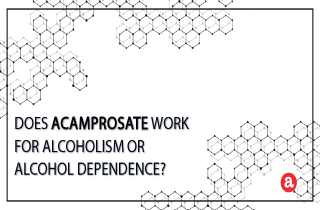Yes.
Acamprosate can help decrease alcohol craving and effectively treat alcoholism. In fact, it is used to help modulate and normalize brain activity for 3-12 months after you quit drinking. But how does this medication work in the body? And can it work for everyone who wants to stop drinking?
We review more about the medical use of acamprosate for alcoholism and alcohol dependence here. Then, we invite your questions about acamprosate effectiveness at the end. We try to respond to all legitimate questions with a personal and prompt reply.
Does acamprosate treat alcoholism?
Yes.
Acamprosate has been used successfully over past few decades in the U.S. and in Europe to treat alcoholism. While acamprosate does not cause sickness if alcohol is ingested it DOES help reduce craving for alcohol. In fact, people who use acamprosate as prescribed tend to “lose interest” in alcohol. Further, those who benefit the most from this medication are people motivated and committed to total abstinence.
NOTE HERE that acamprosate does not prevent the withdrawal symptoms that people may experience when they stop drinking alcohol. However, it can help reduce cravings and address the protracted withdrawal symptoms (PAWS) associated with alcoholism. PAWS can continue in the weeks and months after acute withdrawal from alcohol. Specifically, acamprosate has been effective in reducing symptoms of:
- anxiety
- insomnia
- restlessness
The best candidates for acamprosate as a medication to help you quit drinking are those who are first interested in trying it. Furthermore, people willing and able to take it regularly as prescribed benefit the most. Acamprosate requires multiple daily dosing: the recommended dose is two 333 mg tablets taken three times daily. So, patients who continue to take it as prescribed have better chances for success than those who are unable to keep a daily dosing regimen.
How does acamprosate work in the body?
Acamprosate’s mechanism of action is not completely understood. However, it appears to restore balance to the brain. It is thought to reduce the urge for alcohol by working directly on certain neurotransmitters in the brain (chemicals that transmit information between nerve cells) whose balance has been disturbed because of regular, heavy drinking. Still, research has shown that acamprosate was most effective when it was combined with treatment from mental health professionals like psychologists/psychiatrists and/or mutual-support groups.
So, how does acamprosate affect the body, exactly? Acamprosate seems to work in the body by:
- Involving beneficial modulation of the glutamatergic neurotransmitter system
- Triggering antagonism of the mGLu5 metabotropic glutamate receptor
- Counteracting the imbalance between the glutamatergic and GABA-ergic systems associated with chronic alcohol exposure and alcohol withdrawal
Does acamprosate work immediately?
No. Acamprosate does not work immediately. It can take 5 to 8 days before acamprosate becomes effective and starts to work. This is why experts suggest that acamprosate dosing begin as soon as possible after alcohol withdrawal and that dosing also be maintained during relapse. Ongoing, three time daily treatment leads to best outcomes.
Keep in mind here that acamprosate helps to prevent cravings for alcohol only as long as you are taking it. Continue to take acamprosate even if you do not think you are likely to start drinking alcohol again. Do not stop taking acamprosate without talking to your doctor.
Still, this does not mean that you need to panic if you miss a dose. Take the missed dose as soon as you remember it. However, if it is almost time for the next dose, skip the missed dose and continue your regular dosing schedule. Do not take a double dose to make up for a missed one.
Does acamprosate work for everyone?
No.
In fact, there are some people who should not take acamprosate. People with the following medical conditions should check with a pharmacist or prescribing doctor for medical clearance before starting acamprosate as a treatment therapy for alcoholism:
- Older adults
- Pregnant or breastfeeding women
- Suicidal people
- Those diagnosed with symptoms of depression
- Those taking medications which could be toxic to the kidneys (Ex. aminoglycoside antibiotics)
- Those who are hypersensitive to the drug
- Those with limited kidney function
Additionally, acamprosate has no proven benefit in reducing hazardous drinking or inducing abstinence. To improve efficacy, acamprosate in most often prescribed for people who have achieved abstinence from alcohol prior to starting therapy. Experts recommend that people stay motivated to quit drinking not through medication alone, but by continuing to seek regular psychological or social support for alcoholism.
Who can acamprosate work for?
A recent study reported a relapse rate of under 20% for those who were prescribed acamprosate in a 12 week study period. Still, there are some specific conditions that can lead to successful use of acamprosate…and ongoing, long-term sobriety. Acamprosate works best for people who:
- are committed to staying sober
- are interested in using the drug
- continue psychotherapy or participate in social support groups
- use acamprosate as prescribed
How well does acamprosate work?
Acamprosate is an effective tool that you can use in treating addiction to alcohol. When used as prescribed, it can help diminish cravings to drink. If you have personal experiences to share about using acamprosate, please leave your comments in the section below. And – as always – we invite your questions about acamprosate now. We’ll try to respond to you personally and promptly.









Related Posts